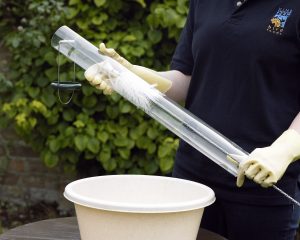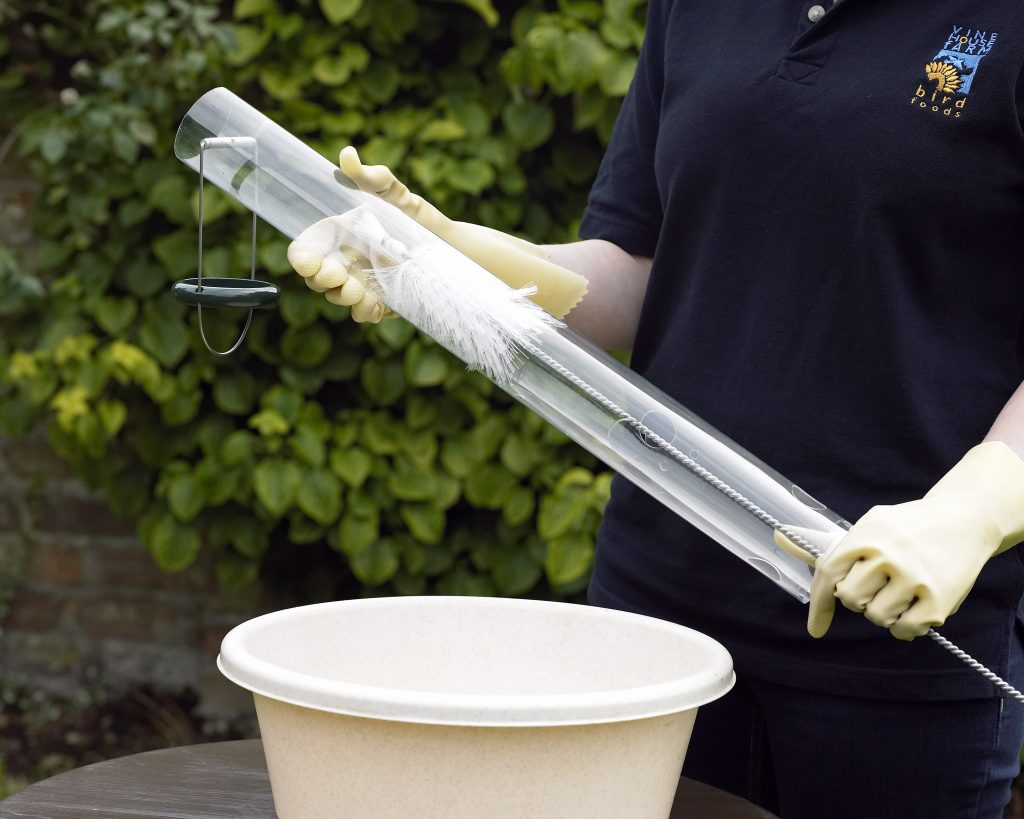Why hygiene is such an important part of feeding garden birds
If you’ve ever seen a bird in your garden, and most probably a Greenfinch, Chaffinch or Siskin, with puffed-out feathers and behaving in a lethargic way, then the chances are that it’s caught a disease such as salmonella – and most probably from a dirty bird feeder or bird table. Of course that offending feeder or table might not have been in your garden but that of a neighbour, but that’s all the more reason we’re so keen to spread the word about the dangers.
We all know that feeding garden birds is fun, rewarding, and can also make a real difference to the breeding success and survival rates of many species. However and like many good things in life there can be a downside, and in this case the danger is of actually putting the lives of the birds we love to help at risk. But it’s important to say right now that if feeders, bird tables and bird baths are kept clean, then this risk is largely removed, and any diseases which a bird does pick up will be just a natural occurrence that happens in the wild.
[caption id="attachment_1901" align="alignnone" width="300"] It might not be the most appealing job, but keeping your bird feeders clean is essential[/caption]
It might not be the most appealing job, but keeping your bird feeders clean is essential[/caption]
So why are feeders and bird tables a potential hazard if not kept clean? Although birds such as finches feed in flocks in the wild, when they’ve exhausted a natural food source – e.g. seeds on dandelion heads – then they quickly move on. So in other words they’re rarely in the same place feeding for very long together. Now compare this to the same birds feeding day-after-day on the same feeder in the same place in your garden, and you can quickly imagine how a problem might develop if the feeder isn’t clean and a bird contracts a disease. This then becomes a vicious circle, as the bird continues to feed for a time (before dying) and, in so doing, passes the disease to other birds.
There are a number of these diseases, but salmonella is the most common as it is a bacterial infection – hence how it can occur on feeders and tables which aren’t clean.
The other major cause of disease is in the build-up of seed husks – in particular from black sunflower and niger – underneath feeders, as bacteria will develop in these and that causes a problem when birds rummage through the husks looking for food.
Keeping the birds in your garden safe from disease is easy and actually takes very little time, so here are our top tips…
1. Give all hanging feeders, ground feeders and bird tables a regular clean with special products like the ones on this page. Once a month is often enough if you don’t have too many birds or plenty of feeders to spread the load, but for lots of birds and fewer feeders then once every two weeks is ideal.
2. Move the feeders to a different location in your garden to give the ground below the feeders a chance to recover and to discourage birds from picking up dropped food on it.
3. Always clear up dropped seed husks from the ground or from a table and ideally every few days, and if you don’t have time to do this then only use husk-free feeds.
4. If you have a bird bath, then ensure the water is kept clean and also give the bath a good clean every week or so (critically, if you use any sort of cleaning agent then ensure you thoroughly rinse the bath out before refilling).
And how about the neighbour’s feeders if you think they’re a problem for the birds which also come to your garden? Well please pass on the information you now have to them, as we’re sure that anyone who feeds the birds will care enough about them to make that extra bit of effort to ensure their welfare takes priority.
This short video features Lucy taking you through what you need to do and the products you'll ideally need to keep your feeders clean and safe.
We all know that feeding garden birds is fun, rewarding, and can also make a real difference to the breeding success and survival rates of many species. However and like many good things in life there can be a downside, and in this case the danger is of actually putting the lives of the birds we love to help at risk. But it’s important to say right now that if feeders, bird tables and bird baths are kept clean, then this risk is largely removed, and any diseases which a bird does pick up will be just a natural occurrence that happens in the wild.
[caption id="attachment_1901" align="alignnone" width="300"]
 It might not be the most appealing job, but keeping your bird feeders clean is essential[/caption]
It might not be the most appealing job, but keeping your bird feeders clean is essential[/caption]Why unclean bird feeders and bird tables are such a hazard
So why are feeders and bird tables a potential hazard if not kept clean? Although birds such as finches feed in flocks in the wild, when they’ve exhausted a natural food source – e.g. seeds on dandelion heads – then they quickly move on. So in other words they’re rarely in the same place feeding for very long together. Now compare this to the same birds feeding day-after-day on the same feeder in the same place in your garden, and you can quickly imagine how a problem might develop if the feeder isn’t clean and a bird contracts a disease. This then becomes a vicious circle, as the bird continues to feed for a time (before dying) and, in so doing, passes the disease to other birds.
There are a number of these diseases, but salmonella is the most common as it is a bacterial infection – hence how it can occur on feeders and tables which aren’t clean.
The other major cause of disease is in the build-up of seed husks – in particular from black sunflower and niger – underneath feeders, as bacteria will develop in these and that causes a problem when birds rummage through the husks looking for food.
Top tips for keeping gardens birds safe from disease
Keeping the birds in your garden safe from disease is easy and actually takes very little time, so here are our top tips…
1. Give all hanging feeders, ground feeders and bird tables a regular clean with special products like the ones on this page. Once a month is often enough if you don’t have too many birds or plenty of feeders to spread the load, but for lots of birds and fewer feeders then once every two weeks is ideal.
2. Move the feeders to a different location in your garden to give the ground below the feeders a chance to recover and to discourage birds from picking up dropped food on it.
3. Always clear up dropped seed husks from the ground or from a table and ideally every few days, and if you don’t have time to do this then only use husk-free feeds.
4. If you have a bird bath, then ensure the water is kept clean and also give the bath a good clean every week or so (critically, if you use any sort of cleaning agent then ensure you thoroughly rinse the bath out before refilling).
And how about the neighbour’s feeders if you think they’re a problem for the birds which also come to your garden? Well please pass on the information you now have to them, as we’re sure that anyone who feeds the birds will care enough about them to make that extra bit of effort to ensure their welfare takes priority.
Watch our short video on cleaning feeders
This short video features Lucy taking you through what you need to do and the products you'll ideally need to keep your feeders clean and safe.



